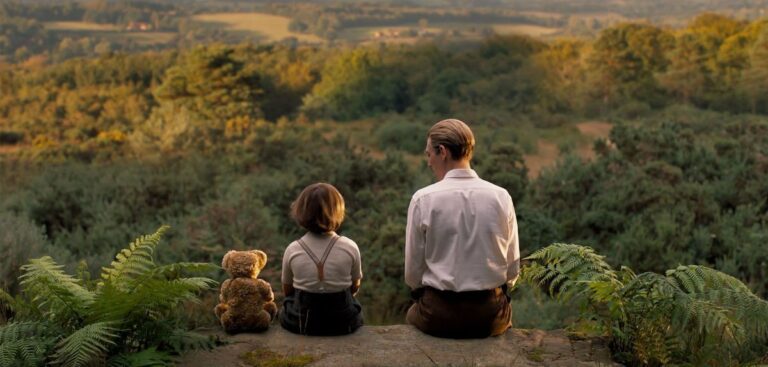On the surface, Goodbye Christopher Robin – about author A.A. Milne’s creation of the Winnie-the-Pooh stories which would become a worldwide phenomenon – appears to share much of the same DNA as Finding Neverland, where a struggling playwright finds himself inspired by the wonders of a child’s imagination and constructs an enduring literary classic. But there’s another tale to be told here, one of a stolen childhood and a lifetime of trauma that were the unfortunate byproducts of the world’s love for an imaginary bear.
In the wake of the Great War, Milne (Domhnall Gleeson) – referred to by friends and family as “Blue” for reasons that are never explained – returns to London and his socialite wife Daphne (Margot Robbie), who has little patience for her husband’s sudden inability to write, nor the frequent manifestations of PTSD that leave him barely able to function in the crowded confines of the city. The birth of a child does little to resolve their marital woes, mostly because neither of them are terribly interested in parenting, and the raising of young Christopher Robin – or “Billy Moon,” as everyone calls him – falls to newly installed nanny Olive (Kelly Macdonald).
As Milne’s condition worsens, the entire collective relocates to an isolated manor in the countryside, where Daphne becomes increasingly foul-tempered and Blue continues struggling with the notion of putting pen to paper. Daphne eventually flees to the city, and when Olive is called away on a family emergency, Blue finds himself truly alone with his son for the first time. Taking Billy (Will Tilston) for a stroll through the woods surrounding their home or watching him interact with the menagerie of stuffed animals gifted unto him by his mother is just the sort of motivation Blue needs to begin creating – but instead of the anti-war novel he’s been dreaming of, this new endeavor is something altogether different.
Seemingly overnight, the Milne family become a household name, but none so sought after as young Christopher Robin himself. Long days of playing make-believe with his father are replaced by an endless serious of photo ops, radio appearances and telephone interviews, and both parents seem a little too comfortable with exploiting the boy (although Daphne is clearly painted as the “villain” here, with Blue presented as being a little more conflicted than history might suggest). The constant attention, combined with the inescapable popularity of the stories, would haunt the real C.R. Milne for the rest of his childhood and lead to a very strained relationship with his family – something the film touches on rather clumsily in a pair of bookend sequences where Blue is much older.

Gleeson gives a fine performance as the troubled author, constantly wary of his surroundings and struggling to forge a real relationship with his son, and Robbie is borderline detestable as the hateful mother obsessed with climbing the social ladder, humanized only by her oh-so-brief interactions with Billy Moon where she presents him with new additions to his collection of stuffed animals. Both are outshined by Macdonald, the genial Scottish nanny unafraid to get stern with her employers when the situation warrants, and Tilston, whose wide eyes and winning smile are impossible not to adore.
Director Simon Curtis frontloads the narrative with the whimsical adventures of an adorable young boy and his father before veering sharply into much darker territory that isn’t explored as much as it could have been, leading the overall experience to feel somewhat unbalanced. Goodbye Christopher Robin has a few moments of magic, particularly in scenes which foreshadow iconic moments from the children’s books we’ve loved for decades, but isn’t the sort of film likely to send audiences home with a smile on their face or a warm feeling in their heart.
An uneven but nevertheless engaging story about the origin of a literary classic, and the stolen childhood that became the unfortunate byproduct of the world's love for an imaginary bear.
-
Score7

